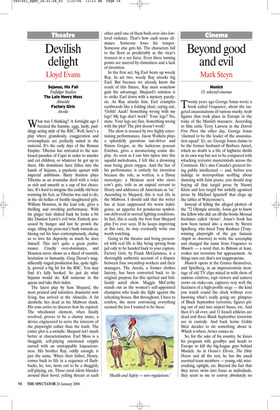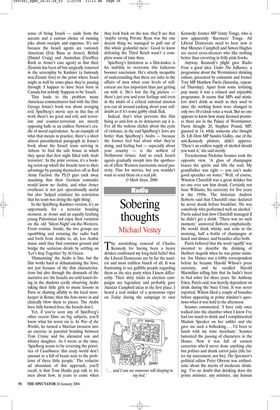Beyond good and evil
Mark Steyn
Munich
15, selected cinemas
Twenty years ago George Jonas wrote a book called Vengeance, about the targeted assassinations of various murky Arab figures that took place in Europe in the wake of the Munich massacre. According to film critic Terry Lawson in the Detroit Free Press the other day, George Jonas ‘claimed to be the leader of the assassination squad’. Er, no. George Jonas claims to be the former husband of Barbara Amiel, which no doubt is a life of highwire thrills in its own way but not to be compared with whacking terrorist masterminds across the Continent. He’s also Canada’s greatest living public intellectual — and, before you indulge in metropolitan scoffing about damning with faint praise, you should stop buying all that turgid prose by Naomi Klein and less turgid but awfully agonised prose by Michael Ignatieff that clogs up the tables at Waterstone’s.
Instead of killing the alleged plotters of the ’72 Olympic atrocity, Jonas got to know the fellow who did: an off-the-books Mossad freelance called ‘Avner’. Jonas’s book has now been turned into a movie by Steven Spielberg, who hired Tony Kushner (Tonywinning playwright of the gay fantasia Angels in America) to write the screenplay and changed the name from Vengeance to Munich — a word that, to Britons at least, evokes not terrorism but appeasement. As things turn out, that’s not inappropriate.
Munich opens at the Games themselves, and Spielberg, in an impressionistic montage of old TV clips mixed in with shots of anxious relatives, rapt viewers and camera crews on stake-out, captures very well the fuzziness of a high-profile siege — the kind you watch round the clock without ever knowing what’s really going on: glimpses of Black September terrorists, figures piling out of and into airport buses, etc. And then it’s all over, and 11 Israeli athletes are dead and three Black September terrorists are in custody. And back home Golda Meir decides to do something about it. Which is where Avner comes in.
So, for the sake of his country, he kisses his pregnant wife goodbye and heads to Europe to kill the big-league guys behind Munich. As in Ocean’s Eleven, The Dirty Dozen and all the rest, he has the usual assorted team members — young, old, wisecracking, uptight, etc. Beyond the fact that they never swim into focus as individuals, they seem to me to convey absolutely no sense of being Israeli — aside from the accents and a curious choice of running joke about receipts and expenses. It’s not because the Israeli agents are variously American (Eric Bana as Avner), British (Daniel Craig) and Australian (Geoffrey Rush as Avner’s case agent) as that their Zionism has been all but surgically removed in the screenplay by Kushner (a famously non-Zionist Jew) to the point where Israel might as well be some place they’re passing through: I happen to have been born in Canada but nobody ‘happens to be’ Israeli.
That leads to the problem many American commentators had with the film: George Jonas’s book was about avenging evil; Spielberg’s movie says in this line of work there’s no good and evil, and terrorism and counter-terrorism are merely opposing balls in an endless Newton’s cradle of moral equivalence. As an example of what that means in practice, there’s a short almost parenthetical paragraph in Jonas’s book about the Israeli team arriving in Athens ‘to find the safe house in which they spent that first night filled with Arab terrorists’. In the print version, it’s a booking screw-up which the Israelis turn to their advantage by passing themselves off as Red Army Faction: the PLO guys yack away assuming that their German comrades would know no Arabic, and what Avner overhears is not just operationally useful but also ‘helped reinforce his conviction that his team was doing the right thing’.
In the Spielberg–Kushner version, it’s an opportunity for a terrorist bonding moment, as Avner and an equally fetching young Palestinian lad enjoy their variation on the old ‘Silent-Night’-on-the-WesternFront routine. Inside, the two groups are squabbling and retuning the radio back and forth from Arabic to, ah, less Arabic music until they find common ground and bridge the sectarian divide by settling on ‘Let’s Stay Together’ by Al Green.
‘Humanising’ the Arabs is fine, but the film works hard at dehumanising the Jews, not just because of the thin characterisations but also through the demands of the narrative arc: the Israelis are cold loners living in the shadows coolly observing Arabs taking their little girls to music lessons in Paris or chatting affably to the local storekeeper in Rome; then the Jews move in and clinically blow them to pieces. The Arabs have fully formed lives, the Israelis don’t.
Yet, if you’ve seen any of Spielberg’s other recent films on big subjects, you’ll know what his worst sin is. In War of the Worlds, he turned a Martian invasion into an exercise in parental bonding between Tom Cruise and his alienated son and whiney daughter. As I wrote at the time, ‘Spielberg seems to be reversing the priorities of Casablanca: this crazy world don’t amount to a hill of beans next to the problems of three little people.’ The reductio ad absurdum of this approach, you’ll recall, is that Tom Hanks pep talk to his men about how, in years to come when they look back on the war, they’ll see that ‘maybe saving Private Ryan was the one decent thing we managed to pull out of this whole godawful mess’. Good to know defeating the Third Reich wasn’t a complete waste of time then.
Spielberg’s limitation as a film-maker is his inability to overcome this ludicrous boomer narcissism. He’s utterly incapable of understanding that there are tides in the affairs of men when your levels of selfesteem are less important than just getting on with it. He’s lost the big picture — there’s just you and your feelings and even in the midst of a critical national mission you can sit around yacking about your selfdoubt as if it’s some gabby chick flick.
Indeed, that’s what prevents this film being as anti-Jew as its detractors say it is. For all the tedious clichés about the cycle of violence, in the end Spielberg’s Jews are better than Spielberg’s Arabs — because the former feel bad about what they’re doing, and feeling bad — especially about your country — is the noblest of Hollywood virtues. And so crack Israeli agents gradually morph into the apotheosis of effete Western narcissistic moral passivity. Fine for movies, but you wouldn’t want to send them on a real job.
© Mark Steyn, 2006























































 Previous page
Previous page